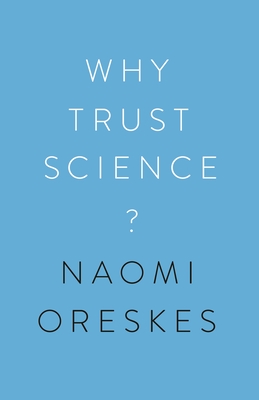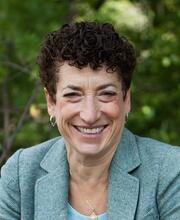

 Princeton University Press
Princeton University Press
Why Trust Science?


Key Metrics
- Naomi Oreskes
- Princeton University Press
- Hardcover
- 9780691179001
- 8.6 X 5.8 X 1.2 inches
- 1.25 pounds
- Science > Philosophy & Social Aspects
- English
 Secure Transaction
Secure TransactionBook Description
Why the social character of scientific knowledge makes it trustworthy
Do doctors really know what they are talking about when they tell us vaccines are safe? Should we take climate experts at their word when they warn us about the perils of global warming? Why should we trust science when our own politicians don't? In this landmark book, Naomi Oreskes offers a bold and compelling defense of science, revealing why the social character of scientific knowledge is its greatest strength--and the greatest reason we can trust it.
Tracing the history and philosophy of science from the late nineteenth century to today, Oreskes explains that, contrary to popular belief, there is no single scientific method. Rather, the trustworthiness of scientific claims derives from the social process by which they are rigorously vetted. This process is not perfect--nothing ever is when humans are involved--but she draws vital lessons from cases where scientists got it wrong. Oreskes shows how consensus is a crucial indicator of when a scientific matter has been settled, and when the knowledge produced is likely to be trustworthy.
Based on the Tanner Lectures on Human Values at Princeton University, this timely and provocative book features critical responses by climate experts Ottmar Edenhofer and Martin Kowarsch, political scientist Jon Krosnick, philosopher of science Marc Lange, and science historian Susan Lindee, as well as a foreword by political theorist Stephen Macedo.
Author Bio
Oreskes is author or co-author of 7 books, and over 150 articles, essays and opinion pieces, including Merchants of Doubt (Bloomsbury, 2010), The Collapse of Western Civilization (Columbia University Press, 2014), Discerning Experts (University Chicago Press, 2019), Why Trust Science? (Princeton University Press, 2019), and Science on a Mission: American Oceanography from the Cold War to Climate Change, (University of Chicago Press, forthcoming). Merchants of Doubt, co-authored with Erik Conway, was the subject of a documentary film of the same name produced by participant Media and distributed by SONY Pictures Classics, and has been translated into nine languages.
A new edition of Merchants of Doubt, with an introduction by Al Gore, will be published in 2020.
Oreskes wrote the Introduction to the Melville House edition of the Papal Encyclical on Climate Change and Inequality, Laudato Si, and her essays and opinion pieces on climate change have appeared in leading newspapers around the globe, including The New York Times, The Washington Post, The Los Angeles Times, the Times (London), and Frankfurter Allegemeine.
Her numerous awards and prizes include the 2019 Geological Society of American Mary C. Rabbitt Award, the British Academy Medal 2019, the 2016 Stephen Schneider Award for outstanding Climate Science Communication, the 2015 Public Service Award of the Geological Society of America, the 2015 Herbert Feis Prize of the American Historical Association for her contributions to public history, and the 2014 American Geophysical Union Presidential Citation for Science and Society.
She is a fellow of the American Geophysical Union, the Geological Society of America, the American Association for the Advancement of Science, the American Academy of Arts and Sciences, and the American Philosophical Society.
In 2018 she was named a Guggenheim Fellow for a new book project with Erik Conway, “The Magic of the Marketplace: The True History of a False Idea,” which will be published by Bloomsbury Press as soon as it is finished.
Education
B.Sc. (First Class Honours) 1981 Royal School of Mines, Imperial College
Ph.D. 1990 Stanford University (Graduate Special Program: Geological Research and History of Science)
Source: Harvard University, Department of the History Science
Videos




Community reviews
Write a ReviewNo Community reviews